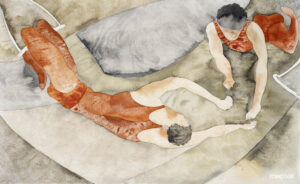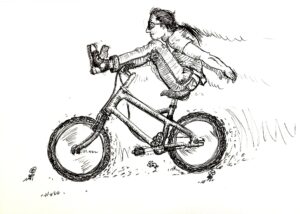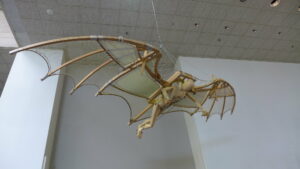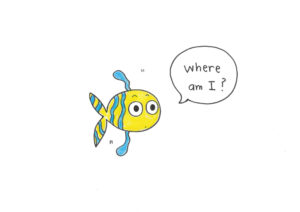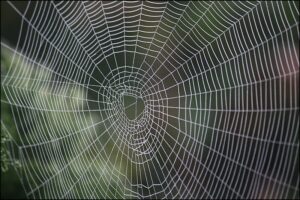Posts by Sarah Callender
A few months back, I bought, at the recommendation of The New York Times’s Wirecutter newsletter, a bottle of snail slime. But it wasn’t just snail slime. It was a Korean treat called CosRX Advanced Snail 96 Mucin Power Essence, that, according to the terrific test teams at Wirecutter, had made the list of Best Korean Skin Care Products.
I swore, years ago, that I would never do Botox or have “work” done. But there was a problem: I was getting older literally every day, and with each passing day, my forehead wrinkles were looking like furrowed rows in dry, fallow fields. I needed help. I needed magic.
Because I had never once seen a K-Pop star with a wrinkly forehead, I thought that perhaps this product would–Shazam!–smooth out my forehead situation. My friends would grab my arm, begging me to share my secret. My middle school students would confuse me with the adorable, sunshine-filled music teacher who could not be a day over 26. My husband would receive high fives from his middle age bretheren who wished their partners were as smooth-foreheaded as I.
When the CosRX Advanced Snail 96 Mucin Power Essence arrived in the mail, I tore open the box and removed the elegant packaging. The text on the frosted glass bottle impressed and delighted me: Being 96% Snail Secretion Filtrate (Mucin), this essence helps the skin to lose less moist while keeping the skin smooth and healthy.
Lose less moist? Sign me UP. With my very sensitive, very dry 53-year-old skin, I am all about holding onto as much moist as possible.
My college-age children however, as well as my husband, were uncomfortable that I would put any kind of snail mucin–Advanced or merely Average–on my face. But I knew the power of mollusk mucin, its ability to create a barrier between skin and environmental danger. I knew it most certainly blocked moist-loss.
I knew this because in 6th grade, my teacher, Mrs. Gillfillan, took our class to the foothills of Somewhere, California, where my classmates and I slept in cabins, where we hiked forested trails softened by layers of lichen and pine needles, and where my entire class and I stood in line to become members of the Sleepy Hollow Elementary Lick-a-Banana-Slug Club.
It was 1982, i.e. teachers allowed 28 students to line up and lick a single banana slug. Life was germy.
By the time it was my turn, 27 of my classmates’ tongues had already grazed the slug’s overripe banana’d personage, and the slug was relying on its best (and only) defense: its V-8 turbo-charged emergency slime boosters. In other words, instead of me leaving my saliva on its back, it left its (definitely Advanced) mucin on my tongue. The licker had become the lickee.
For at least 36 hours post lick, my tongue experienced an inescapable slick of slime as well as a sharp tingling sensation. I felt something that I now […]
Read MoreWhile I have earned nothing beyond a BA in English, I’ve never let that stop me from pretending I have a vast array of training and advanced degrees at my fingertips. Need a marriage therapist who’s willing to work for free? I’m your gal. Looking for a pro bono private investigator? You’ve come to the right place! Hoping to stumble upon a psychiatrist who specializes in diagnosing those who don’t know they need a diagnosis? Yep, I can do that too.
On December 24th, I found myself at Safeway, picking up the items I had forgotten to purchase on the grocery runs I had made on the 22nd and 23rd. Safeway is my go-to because I grew up shopping at Safeway. And I am a cheapskate. It’s also a little gritty, which I appreciate, because at the chichi grocery store that’s a little closer to my house, the apples are too beautiful, the specialty items too special, the shoppers too coiffed. At Safeway? I feel perfectly at home log-rolling myself from bed to car to Safeway. No coiffing required.
It was in the produce section that I found myself picking green beans from a heap and standing about fifteen feet from a couple near the potatoes. I noticed them because they appeared both too coiffed to be shopping at Safeway and too calm to be shopping on Christmas Eve. But there was something else about them that piqued my interest.
Summoning everything I learned while earning my pretend PhD in Psychology, I began my initial assessment of the couple. I guessed they were in their early 40s. She had a sassy blonde bob and wore denim trousers and a Santa hat. He was well-dressed and conventionally handsome; if you Google “generic handsome man,” you will see many iterations of him. They each wore a ring on their wedding finger. Mr. Handsome was pushing the cart.
They looked nice enough, but something was vaguely rotten in this aisle of Safeway.
Knowing I needed to move physically closer to the couple, I called on the acting skills I had learned during my pretend years at Julliard. Pretending to be checking my grocery list, then pretending I had ALMOST forgotten the onions, I pushed my cart over to the onion section. Sometimes you pretend you need a Walla Walla sweet, even if you already have onions at home, so you can eavesdrop on a couple in the nearby potato section.
And eavesdrop I did! I listened as the couple spoke of their butter lettuce options as if butter lettuce could make or break Christmas. They discussed the gift card they had purchased for his parents (at the fancy Italian restaurant down the street) and the gift card they would buy for her parents (at the fancy bakery up the street). They discussed stocking stuffers for their kids, the wrapping of gifts they needed to do that evening, the bourbon they wanted to get at the fancy liquor store. All this, while I committed, acting-wise, to finding the most perfect onion I didn’t even need.
It wasn’t the content of their conversation that felt off; it was their tentative, cautious tone and […]
Read MoreTwo weeks ago, I gathered my courage (it was stuffed in a storage bin under my bed) and volunteered to make calls to Undecideds in Pennsylvania. My even-keeled, deeply-uncomfortable-with-confrontation husband was worried. Rightfully so. I am unevenly-keeled. One of my keels is a sectional sofa. The other, a ping pong ball.
“You might have a hard time,” he said, “not getting into it with people. People can be rude. And sometimes you get into it with people who are rude.”
He was wrong about this. I don’t sometimes “get into it” when people are rude. I almost always and always immediately “get into it” when people are rude.
“There’s a script,” I explained, full of bravado. “And I’m not trying to sway people. I’m only checking to make sure they have a voting plan. Also, these people reside in Pennsylvania, the state that contains the City of Brotherly Love. It’ll be fine.”
I did have a snazzy script to follow. Depending on how the Undecideds responded to my first question, I’d click a button, and instantly be taken to a specific script meant for someone who had responded in that particular way. Like a Choose-Your-Own-Adventure, except that Undecided strangers were my adventure-choosers.
“I’ll stick to the script,” I promised my husband. “I will.”
Alas, nearly 100% of people on the Undecided Brotherly Love list either hung up on me immediately, or, right after I introduced myself, warned that I should, “STOP CALLING!” Or that I, “WASN’T GOING TO CHANGE THEIR MIND!” Or, as one fellow not-lovingly suggested, “GO TO HELL!”
But instead of “getting into it” with these Pennsylvanians, I felt only empathy. These folks have been barraged by politics–TV ads, calls, texts, emails–for months. They weren’t rude. They were weary.
Weary too, I invented a new goal: connect with the weary. NOT to change their minds, but, perhaps to feel less alone in my own weariness.
My selfish, rebellious script went a little something like this:
My name is Sarah, and I don’t know about you, but I cannot WAIT to be on the other side of November 5th. How are you holding up?
Dozens of people still hung up on me. But some did not.
Not-Tanya, for example.
“I am NOT Tanya,” she said, after I asked to please speak to Tanya. “I have never BEEN Tanya,” she continued. “And I will never BE Tanya!”
It seemed that voting registries had mislinked Not-Tanya (the person) with Real-Tanya’s phone number.
“Oh, gosh,” I said. “I have been getting phone calls for ‘Deborah’ and texts for ‘Anna.’ And my husband, Jeff, keeps getting texts for ‘Mark.’ And we are none of those people.”
Not-Tanya and I then proceeded to have a lovely chat, not about politics, but about how NO ONE SAID PARENTING ADULT CHILDREN WOULD BE SO TRICKY. At the end of the call I said, “Well, thanks for the chat, Not-Tanya. Just two weeks until we’ll only be called by our real names!”
And I felt better. Parenting adult children really was tricky. Where, Not-Tanya and I had lamented, were the hundreds of “How To” parenting books that had helped us navigate every stage prior?
Then there was John. John who had moved to IL but apparently had gotten about 300 calls and texts from political volunteers who believe he still lives […]
Read MoreI’ve always prided myself on having a pretty talented schnoz, and I’m not shy about touting it. I am, it seems, a snout-touter. As a result, my husband will turn to me, holding out a carton of milk with a Use By date of three days prior, his eyebrows raised as he silently requests my assessment of spoilage. When my middle school students walk into the classroom, I know which ones have hit puberty over breakfast or during the bus ride to school. I can tell, from fifty feet away, when my colleague, a secret smoker, has just indulged. The summertime smells findable in a downtown Seattle alley, the sooty stench of truck exhaust, and the odors of other people’s feet make me queasy.
In June, after hugging my 8th graders goodbye, after finishing report cards, after removing the candy wrappers, empty Cheetos bags, eraserless pencil stubs, someone’s forgotten Invisalign, a half-eaten crusty cupcake, used tissues, and naked Dum-Dum sticks from those ridiculous under-desk cubbies (all the while muttering, I am NOT your mother!), I crawled around my classroom, nose to carpet, trying to identify the source of the stinky smell I had been noticing for weeks.
But after ten minutes of aggressive sniffing that left me dizzy, I had to accept defeat. I could not find the stinky thing in my classroom. What did this mean? Was I losing my gift? Should I let my husband know he could no longer trust my milk-nose? And if I had lost my nose-o mojo, did this portend cognitive decline? The possibility was distressing.
An additional source of distress: on Day 2 of my summer break, I returned the most recent round of Book #1 revisions to my very patient, very long-suffering editor, and sat down to work on Book #2. After rereading the manuscript (which I had not done in years), I could sense that something was off, but even as I spent time crawling around the room of my story, I could not detect the source of the offness.
Great! I thought. Fantastic! In a mere forty-eight hours, I had lost my sense of smell and my sense of story. The second loss was particularly concerning because my summertime writing clock was ticking. I did not have time to be stumped and stuck. I needed to sniff out the problem and deal with it, preferably in the next hour, worse case, by lunchtime.
After some moments of panic, (during which I googled how to write a novel), I returned to the two seeds of the story. The first was a question: To what extent do our memories affect and inform our identity? The other was an image: Leonardo da Vinci’s ornithopter, a contraption that the 14-year-old narrator and his grandfather build together as the grandfather copes with early-stage Alzheimer’s.
I googled Leonardo’s sketch of the flying machine and studied it, realizing I knew very little about this man who […]
Read MoreMy relationship with crows is best described as complicated-but-definitely-trending-positive. Last Thursday evening however, I was startled by a sudden, fervent, 5-alarm cacawphony. No matter, I told myself. They mean me no harm. They are not coming for me. They are simply playing games, noisy games like Taunt the Neighborhood Bald Eagle. Or, Taunt the Neighborhood Raccoon. Or, Taunt the Red-headed Postal Carrier, the One with Kind Eyes and Dog Treats.
But after ten minutes, the cawing had only grown louder, and when I tiptoed to the window to peek at the mayhem, I was amazed: close to one hundred frenzied, agitated crows had come to land on the oak tree just outside our house. Most of them were cawCAWing their hearts out.
Then I saw the reason for their distress: on the sidewalk under the oak tree lay a dead crow. Its body looked terrible, wings bent at weird angles.
Oh, I breathed. Oh dear.
A few crows hopped nervously, almost awkwardly, around their crumpled friend, but most hovered in the tree above the deceased, cawing with passion and despair. It hurt my heart as much as it hurt my ears. It seemed I was witnessing a crow’s funeral.
We Americans, generally, aren’t great mourners. We are embarrassed by wailing grief, by such unabashed, unrestrained sounds of despair, by emotion that cannot be shushed. But these beautiful, brilliant, crows did not tamp down their suffering. They did not silence their agony. They attended to their dead with beautiful, anguished suffering.
As darkness fell, and the cawing slowed then finally stopped, I realized I would have to take care of the dead crow. A pleasant realization this was not, and I won’t recount the details of my awkward method of transferring a dead crow into a series of garbage bags, but shortly, with the crow double-bagged and safely entombed in my garbage can, I went back inside, washed my hands, then returned to my laptop and Googled “crow funeral.”
I learned something interesting: while bird experts do consider this phenomenon a “crow funeral,” the mourning sounds that I attributed to grief and mourning, were more likely a very loud and lengthy conversation like this: “Hey! Get OVER HERE ASAP! Edgar is DEAD! Let’s determine WHAT HAPPENED to him! We need to get to the BOTTOM of this MYSTERY so we can avoid whatever it was that ended Edgar’s life! Edgar’s life AND death must serve as A CAUTIONARY TALE!”
Or something like that.
Further research did indeed confirm the funeral was less an invitation to express suffering, and more a way to discuss, research, and ultimately avoid the suffering their fallen friend had endured.
As someone who also prefers to avoid suffering, I understood the crows’ behavior. I really and truly do everything, within reason, to prevent the possibility of suffering.
Actually, wait … okay, sorry. Looking at what I just wrote, I see that’s not accurate. I don’t do everything within reason to prevent suffering. In fact, when I step back […]
Read MoreTwo weeks ago, my husband and I splurged: we went to Mexico over my mid-winter break, just the two of us, to celebrate our 25th anniversary. We hadn’t done anything so splurgey since 2018 when we went to Mexico to celebrate our 20th anniversary.
I love Mexico.
I love the tacos they have in Mexico.
I don’t love the sun they have in Mexico, and sand and I have never had a healthy relationship, but in addition to the tacos, así como las oportunidades de celebrar aniversarios especiales, I love dusting off my rusty Spanish and heading out on a quest to find gritty, tourist-free gems. Including taco-gems.
On this trip, we flew into Cancun (¡No gracias!), bee-lined to Tulum, 90 minutes south, got settled in our $54/night hotel, and went in search of tacos. Y madre de dios, los tacos!
But even after four days of wandering and exploring, even using street food as my North Star, I could not get my bearings in this wonderfully gritty and unpolished part of Tulum. By this I mean, simply, that I couldn’t understand what Tulum was.
I do wonder if Tulum, with its massive growth and development, has also not yet figured out what it is. It’s not its fault. You can’t know what you are when you aren’t in charge of the pace of your own growth. You can’t know what you are when you haven’t been allowed time to reflect on what you want to become. An identity crisis is inevitable.
At the same time, I was listening to Trust, a novel by Hernan Diaz. I’ll be honest: had it not been my book club’s pick for March, I would not have continued listening, largely because, much like I couldn’t get my bearings in Tulum pueblo, I could not get my bearings in the story. I couldn’t understand what the story was, who I was rooting for, what I was hoping for. I even started over, listening to the first chapters again, thinking that I was the problem. But that didn’t help. It also didn’t help that the cover of the novel suggested–to me–that this was sci-fi, likely involving aliens and their attempt to put NYC under a glass cloche, thereby containing capitalism, greed, and a real estate mogul. But that’s on me. I know what I should and should not do with a book’s cover.
The tandem experience, however, of feeling out of place in a novel and a little lost in taco-heaven, made me think about why I read and why I travel: to experience something new, to slip into the shoes of another, to learn about unfamiliar worlds, to eat literal and metaphorical street food, preferably without getting the poops.
But how arrogant to think that I should understand, in only a matter of days, a new neighborhood in a new city in a country that is not my own. I was trying to fit “Tulum” into a clearly-labeled box, one where I would get to experience exactly and […]
Read MoreSarah, an 8th grade English teacher, liked getting to school an hour before the students invaded her quiet classroom with their wonderful and terrifying presence, with their gangly bodies and their confusing slang and their beautiful brains that, one moment demonstrated Einstein-esque brilliance, and the next moment, the decision-making skills of a prehistoric reptile. My goodness, did Sarah adore her students! She really did. This was not sarcasm.
They were, however, exceptionally loud. Even the quiet ones were loud, though quietly so.
But in this hour before school started, Sarah was guaranteed a distraction-free zone where, if her grading was under control and her lessons planned, she could find time to work on her WIP.
Though finding time to work on her WIP felt nearly impossible these days. For starters, her grading was rarely under control, and her lessons always needed fine-tuning. Plus, she was trying to understand how on earth to parent college-age children, young adults who expected her to maintain a cheery, on-call presence, to answer the phone when they happened to call, and to listen, without judgment or advice, even when any idiot could see that a mother’s judgment and advice was precisely what they needed.
At the same time, she found herself supporting and loving her getting-along-in-years family members, a privilege that required a brain muscle she had yet to strengthen. Sarah also very much wanted to spend more than five minutes a day with her equally busy husband. After all, she loved him, and she realized that being an empty-nester was more fun when someone else shared the nest.
Along with the marriage-tending, the sandwich-generationing, and the full-time teaching, there were book edits to address whenever her lovely, patient editor sent along yet another round of revisions. Also a cover art artist to select. And a marketing and publicity plan to consider.
All this to say, Sarah was busy. Yet she remained hopeful.
Today, she told herself on the commute to school, there will be time to work on the WIP.
With great optimism, Sarah unlocked her classroom door, flipped on the motion-sensitive lights, did a swirly, flapping-armed dance so the insensitive lights would turn on, then took a seat at her desk, plugged in her laptop, and checked how many pieces of student work still had to be graded. The number was staggering. But before addressing the yet-to-grade work, she went to the NYT Games page for her morning ritual.
First (and it was always in this order) she played The Mini, then the Wordle, then she texted her father her Wordle score, then she proceeded to play Connections, which she liked quite a lot because she could see she was getting much better at it. Plus, the colors were pretty.
After that, she checked her school email, and on this particular day, read the NYT Athletic article about the Seahawks’s playoff chances (better after beating the Eagles; worse after losing to the Steelers), addressed a time-sensitive, student-related email, and fought the temptation to return to the NYT Games page where she could play the Spelling Bee.
No, she told herself. Today you will work on your WIP! […]
Read MoreOctober has never been my favorite month. It seems to stick around much longer than necessary, certainly much longer than the other eleven. It wears steel-toe boots and one of those oilskin raincoats worn by Australian cowboys (and, for some reason, my not-Australian high school boyfriend). October is surly and obstinate. It thinks it’s handsome, and in some lights it is. But it’s mean-handsome. Cruel handsome. Plus, costume’d strangers scare me, especially when they pound on my door after dark and demand things. And candy, even fun- and mini-size, does no one any good.
But this October felt especially ponderous and steel-toed. Terrifying, uncertain, overwhelming. A bad surprise in my family’s health hit hard. And of course, there were (and are) the front pages of the Times or the Chronicle or the Journal plastered with words and images so violent and absurd that I had to work very, very hard to remind myself that Love still has a foothold in the world.
So this October I went in search of aloe for my soul, and found myself returning to one of my most favorite love stories. I first read Their Eyes Were Watching God in 1988 as an 11th grader, then again in a college course, then again in the late 90s as a high school ELA teacher. But this October, instead of reading Zora Neale Hurston’s words on paper, I listened to the late Ruby Dee’s stunning performance of the story. I was reminded of the power of imagery, of character, of Hurston’s prescience. Most of all though, I was struck by Hurston’s syntax.
Syntax is a weird word. A cold word. But in writing, syntax simply refers to the way a sentence is built, constructed, and architected. And isn’t a perfectly constructed sentence a work of art?
Most likely none of you was in my 9th grade English class with Mrs. Stark, the woman responsible for my ability to speak in front of people without anxiety, my understanding of why a teacher must always use breath mints before conferencing with a student, and my love of sentence diagramming.
From my love of sentence diagramming came my love of sentence construction. Mrs. Stark taught me to appreciate the visual beauty of a diagrammed sentence. She also taught me that specific situations require specific sentence structures. So we writers must appreciate and understand the power of syntax.
First, syntax has the power to move readers’ eyeballs.
Of course a reader keeps reading because of the content of each sentence. A reader also keeps reading because the writer propels the reader from sentence to sentence via varied syntax. And that’s important. We need the reader’s eyeballs to move effortlessly, eagerly, efficiently from the upper left to the lower right corner of the page.
Check out Gary Provost’s words from 100 Ways to Improve Your Writing (and feel free to read it aloud):
“This sentence has five words. Here are five more words. Five-word sentences are fine. But several together become monotonous. Listen to what is happening. The writing is […]
Read MoreI grew up in a small town that contained the following highlights: Blockbuster Video, Loard’s Ice Cream, Nation’s Hamburgers, and Safeway. A library, a drug store, as well as a bookstore and community center. A beautiful old movie theater with a domed, celestial ceiling and lumpy velvet seats that smelled weird. That was about it. As teenagers, unless we hopped in the car and headed west, we had to work hard to find local entertainment.
Therefore, on weekends, I often found myself hanging out with my best pals in the Safeway parking lot. Literally in the parking lot. To this day, I don’t know why this seemed like fun, this loitering. We must have been waiting for something to happen. Or maybe we weren’t waiting for something to happen. Maybe we were waiting for anything to happen.
I don’t remember being bored. I remember hanging out with my best pals–friends I still hold dear nearly forty years later. In the Safeway parking lot, free from eavesdropping parents and irritating siblings, we did the most low-tech of things: talked, laughed, and gossiped.
How dull our lives must have looked to others. Perhaps we looked suspicious too. After all, we were loitering. And as many a sign will remind us, loiterers are rarely a welcome sight. But the simplicity of that activity, the absence of technology, movies, music, and alcohol, allowed room for us to connect in meaningful ways. Even if it looked really boring.
This summer, during my break from teaching, my life must have looked just as boring. The day after school got out, I tackled the still-major revisions suggested by my editor. For the next two months, I revised and revised and revised, and when I wasn’t revising, I was thinking about the revisions, puzzling over how to pull off the changes my editor had suggested. And when I wasn’t revising or puzzling, I was quietly and privately panicking that I wasn’t going to be able to pull off the revisions my editor was expecting. That’s it. That was my summer. To a casual observer it would have been as exciting as watching four teenagers hang out in the Safeway parking lot.
Okay, sure, I did do a few other things this summer. I ate significant amounts of watermelon. I occasionally showered. Less occasionally, I did ten pushups. I stood in my back yard, watching my May/June mason bees and, later, my July/August leafcutter bees, laying eggs and building little capsules for their babies in their bee chalet. I lured crows into our backyard with stale crackers. I considered sorting and refolding the old sheets and towels in the linen closet. I ordered mattress protectors, surge protectors and daughter protectors, plus a ramen-in-the-microwave cooker for my sweetie who started college in August (two time zones away). I enjoyed walks to the neighborhood brewery for a cider with the husband and the dog. I caught up with dear, neglected friends. I went head-to-head with my dad on the daily Wordle.
But mostly I loitered in the Safeway parking lot of my story. Not actively loading items into my shopping cart. Not […]
Read MoreMy daughter, who just graduated from high school, is a bit of a collector. A collector of things she no longer needs, uses, or wears. A collector of things that, in my mind, should be tossed, recycled, repurposed, and donated. But because she is not I, her bedroom, when left unchecked, takes on the beautiful properties of sedimentary rock, the layers of which reflect and mark certain eras, events, and phases of her life.
During the great clean-out of June 2023, she came to show me a journal she had unearthed. “Look at this! It’s from 10th grade. These were my goals for 2021.”
With her permission, I share it here:
Academic:
Physical:
Mental:
Relationships:
I love that “whiten teeth” and “loving myself” exist on the same list. I love her use of caps for “CONFIDENCE.” But the item that stuck out to me most was the last: “boyfriend.”
I imagine I had a similar list at some point, during my own pre-boyfriendozioc era. And when I started writing in 2001, I set for myself similarly naïve goals:
This last week, the middle school where I teach deployed me to Chicago so I could attend the American Library Association conference. My mission? Gather new book titles, meet authors, swim in the voices and stories of underrepresented writers. I attended the award banquet for the winners of the Caldecott and Newbery Awards. I heard a keynote by Judy Blume. Amanda Gorman and Christian Robertson (the lovely illustrator of Gorman’s upcoming book of poetry), spoke at the conference’s closing event. I listened to what authors, teachers, and librarians are doing to thwart the plans of the few-but-screechy voices who believe keeping books off shelves keeps young people safe. I learned that Illinois recently became the first state to ban book bans. I listened to brave, often-marginalized writers share the experience of writing the stories of their hearts. I was reminded that books shepherd young people through the gauntlet of adolescence. I got to pose with foam cutouts of Narwhal and Jelly in order to get the most adorable Narwhal and Jelly tote bag. And, I got to meet my editor.
Before the conference (and since June of 2022), I had only emailed with my editor. I had no idea what she looked like (she maintains a Sasquatchian presence on the internet), or whether she was warm or aloof, quiet or outspoken, tender or tough.
I did know she was the most detailed, thoughtful, wise, ass-kicking editor I had ever not met.
Her editorial letters and margin comments were breath-taking in their extensiveness. They were brutally honest, specific, humbling, and brilliant. They punched me in the gut and made me feel like a student who had disappointed the teacher.
“She’s hates it!” I told my agent after my editor returned her second editorial letter. “I have let her down! She’s going to change her mind about me!”
My agent, […]
Read MoreThe world is a marvelous and mysterious place. It’s also fairly un-understandable, at least to me. String theory in physics is well beyond my understanding. I am equally baffled by the internet, by NFTs, by the resurgence of mom jeans and mullets. Oh, and what about the artistry of arachnids? I don’t understand how that level of precision is possible, or, how those filaments can be so sticky for a fly but not for a spider.
I also spend considerable time wondering about the human brain, how it works, how it thinks, how it makes so many millions of body-related things happen. Not that the gallbladder or ear bones aren’t marvelous. But those body parts specialize in, basically, a single job. The brain is the renaissance man of the organ world: our brain tells our legs how to walk and our eyelids to blink. It tells us when to laugh because something’s funny or sleep when we are sleepy. It creates, sorts, and stores memories–some but not all. It makes us fall in love (or not). It allows someone (not me) to pole vault. It thinks. It dreams. It wonders. And for us writers, our brains allow us to create stories, our own carefully-constructed filaments of silky sticky stuff.
My brain and I also spend a lot of time thinking about creativity, especially when it comes to storytelling. How does a brain generate an idea? And specifically how do we writers come up with an idea for a story?
A few weeks back, an email landed in my inbox advertising a webinar called “Where do ideas come from?” and as I was on spring break and as I needed some help with the ideas in my pesky, crazy-making WIP, I hopped on the Zoom call and was delighted by what Joyce Hesselberth, writer and illustrator and all-around creative soul, had to say about ideas.
The seminar didn’t help me understand the neuroscience of ideas or why I wonder about arachnid architecture, but it most certainly got me thinking about how I can lubricate the idea-making portion of my brain squiggles, about how I can put myself in situations where, somehow, my cerebral soil will yield the most ideas.
Here’s what I came up with (you’ll get to share too):
Notice. When I take my dog on a walk, I bring my phone along so I can listen to a book or call a pal, or at the very least, track my steps. But the other day, I forgot my phone, and while I considered going back (why do I care about tracking steps?) I proceeded to walk, phoneless.
And boy, did I notice! The fragrance of some species of some springtime flowering bush. The symmetry of leaves. A bee’s bumbling tenacity: Do bees see all colors and smell all fragrances? Is it the stinger that gives bees such a bad rap, or is it their classification of “insect”? Do female worker bees feel any bitterness toward or envy of the queen?
I noticed a school bus parked in someone’s driveway: Where does one buy a […]
Read More

